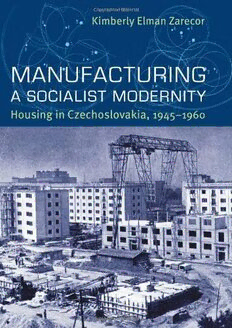
Manufacturing a Socialist Modernity: Housing in Czechoslovakia, 1945-1960 PDF
Preview Manufacturing a Socialist Modernity: Housing in Czechoslovakia, 1945-1960
Kimberly Elman Zarecor Housing in Czechoslovakia, 1945–1960 Manufacturing a SocialiSt Modernity Zarecor third pages.indd 1 2/24/11 2:54 PM Pitt SerieS in ruSSian and eaSt euroPean StudieS Jonathan harriS, editor Zarecor third pages.indd 2 2/24/11 2:54 PM Manufacturing a SocialiSt Modernity Housing in Czechoslovakia, 1945–1960 Kimberly elman Zarecor University of PittsbUrgh Press Zarecor third pages.indd 3 2/24/11 2:54 PM Published by the University of Pittsburgh Press, Pittsburgh, Pa., 15260 Copyright © 2011, University of Pittsburgh Press All rights reserved Manufactured in the United States of America Printed on acid-free paper 10 9 8 7 6 5 4 3 2 1 Text design and typesetting by Kachergis Book Design Library of Congress Cataloging-in-Publication Data Zarecor, Kimberly Elman. Manufacturing a socialist modernity : housing in Czechoslovakia, 1945–1960 / Kimberly Elman Zarecor. p. cm. — (Pitt series in Russian and East European studies) Includes bibliographical references and index. isbn-13: 978-0-8229-4404-1 (cloth : alk. paper) isbn-10: 0-8229-4404-9 (cloth : alk. paper) 1. Architecture, Domestic—Czechoslovakia—History—20th century. 2. Architecture, Domestic—Political aspects—Czechoslovakia—History— 20th century. 3. Architecture and state—Czechoslovakia—History— 20th century. 4. Dwellings—Czechoslovakia—Design and construction— History—20th century. 5. Housing—Czechoslovakia—History—20th century. 6. Socialism—Czechoslovakia—History—20th century. 7. Social change— Czechoslovakia—History—20th century. 8. Modern movement (Architecture)— Czechoslovakia—History—20th century. 9. Czechoslovakia—Social condi- tions—1945–1992. I. Title. na7412.c9Z37 2011 720.9437´09045—dc22 2010045864 Zarecor third pages.indd 4 2/24/11 2:54 PM For Scott and Maximilian Zarecor third pages.indd 5 2/24/11 2:54 PM Zarecor third pages.indd 6 2/24/11 2:54 PM Contents Acknowledgments ix Introduction: Writing a Postwar History 1 1 Phoenix Rising: Housing and the Early Debates on Socialist Modernity 13 2 Typification and Standardization: Stavoprojekt and the Transformation of Architectural Practice 69 3 National in Form, Socialist in Content: Sorela and Architectural Imagery 113 4 A Vision of Socialist Architecture: The Late Career of Jiří Kroha 177 5 The Industrialization of Housing: Zlín and the Evolution of the Panelák 224 Epilogue 295 notes 299 Bibliography 361 Illustration Credits 369 Index 371 Zarecor third pages.indd 7 2/24/11 2:54 PM Zarecor third pages.indd 8 2/24/11 2:54 PM ACknowledgments There are many people to thank for their help and support with this proj- ect. Kenneth Frampton showed me the many ways that an architect can be a designer—through buildings, words, and texts. His passion for architecture inspired me to be a better scholar and teacher, and for his guidance, support, and patience I will always be grateful. Bradley F. Abrams has been a won- derful mentor, friend, and enthusiastic reader. When no one else was inter- ested in the small details, his office door was always open, and I thank him for his encouragement and advice. I am also indebted to Reinhold Martin, Jorge Otero-Pailos, and Jean-Louis Cohen for their support, suggestions, and patience through a long project. When I first decided to write a book about former Czechoslovakia, I did not know the country’s languages, history, or architectural past. My first exposure to the Czech Republic was a weekend visit in 1999 to see the Tugendhat House in Brno with a group led by Terrence Riley from the Museum of Modern Art in New York and Barry Bergdoll from Columbia University. Not only did the house astonish me but I also discovered a beautiful city full of modern buildings by architects with unknown names and precious few resources in Western Euro- pean languages to tell me more. For this first glimpse of modernism in the for- mer Czechoslovakia, I am grateful to them. I also thank Mary McLeod, Robin Middleton, Catherine Nepomnyashchy, Joan Ockman, Mark von Hagen, Rich- ard Wortman, and Gwendolyn Wright. Marcela Ehrlich-Rýdlová, Peter Kussi, and Christopher Harwood taught me Czech—without them, this project would not have been possible. This project benefited from the support of many academic communities. I consider it a privilege to have studied with so many talented and brilliant ix Zarecor third pages.indd 9 2/24/11 2:54 PM
